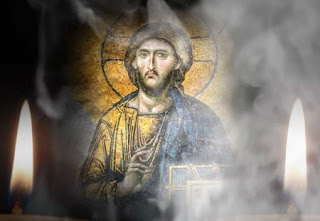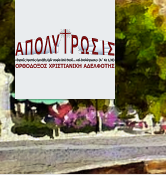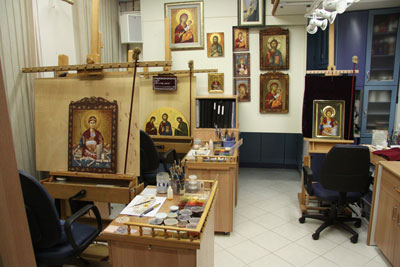Translation from the article:
Εὐαγγέλου Ἀλ. Δάκα, Λατρεία εὐάρεστη στόν Θεό, περιοδ. "Ἀπολύτρωσις" 73 (2018) 104-166.
(Evangelos Al. Dakas, PhD in Theology and Philologist)
 We Orthodox feel proud, and rightly so, about the spiritual magnitude of our worship. The Orthodox Church for God’s worship preserves, in this matter as well, the tradition of the holy Fathers, which has its roots in the apostolic era. Our worship does not try to impose itself on the believers and humiliate them before God’s omnipotence, as the Papists do. For the Orthodox Church, the Lord is not primarily a “mysterium tremendum” i.e., a mystery that causes terror but a “mysterium fascinosum”, a mystery that attracts love. Nor does it only teach, as is the case with Protestant worship. The Orthodox worship, on the one hand, incarnates the miracle of God's revelation in Christ here and now and on the other hand, makes the Lord's life, the Cross and his resurrection the existential identity of the believer.
We Orthodox feel proud, and rightly so, about the spiritual magnitude of our worship. The Orthodox Church for God’s worship preserves, in this matter as well, the tradition of the holy Fathers, which has its roots in the apostolic era. Our worship does not try to impose itself on the believers and humiliate them before God’s omnipotence, as the Papists do. For the Orthodox Church, the Lord is not primarily a “mysterium tremendum” i.e., a mystery that causes terror but a “mysterium fascinosum”, a mystery that attracts love. Nor does it only teach, as is the case with Protestant worship. The Orthodox worship, on the one hand, incarnates the miracle of God's revelation in Christ here and now and on the other hand, makes the Lord's life, the Cross and his resurrection the existential identity of the believer.
However, it is necessary to take certain things into serious consideration, since the spiritual alienation that threatens us now, also affects the life of worship:
1. The foundation of our worship cannot be other than Christ's words to the Samaritan woman that “God is Spirit, and those who worship him must worship in spirit and truth” (Jn 4:24). That is, our worship will be true and pleasing to God, if it will be first offered at the altar of our soul, at the shrine of the inner man which is not made by hand. When this does not happen, when the incense of our love for the Lord does not burn in our souls but sin smokes, all the other external offerings and sacrifices are in vain and they anger God. We find many examples of such vain worship in the people of Israel who, while blessed “in a shocking way” by Yahweh, deviated too many times into ritualism. Externally, they offered what the Mosaic Law defined, that is a multitude of bloody and bloodless sacrifices, but internally, in their hearts, they were indifferent to God. Other gods were worshiped there, their passions and desires. The Spirit of God through the prophet Isaiah says; “To what purpose is the multitude of your sacrifices to me?” “I have had enough of burnt offerings of rams and the fat of fed cattle.... When you spread out your hands, I will hide my eyes from you; Even though you make many prayers, I will not hear. Your hands are full of blood... Wash yourselves, make yourselves clean; Put away the evil of your doings from before my eyes.... Come now, and let us settle the matter” (Is 1:11. 15-16. 18). But Israel did not listen. They thought that by their sacrifices they would oblige God to help them. And in this way, they lost the divine adoption.
2. We must pay particular attention to another point, too. That is the manner of our worship. The priests Hophni and Phinehas, sons of the high Priest and Judge Eli, were exemplary punished by the Lord, because their behavior inside the Tabernacle was unacceptable (see 1 Sam 2:12-17, 22-36). Are we, priests and people, conscious of the sanctity of the church? Or do we often behave in this holy place, especially during the celebration of the Sacraments, as if we were in the marketplace? The fact that many times we do not understand what is being chanted or said, because the clergymen and chanters give more importance to the melody than to the meanings, also contributes to this situation. The apostle Paul faced a similar problem in the church of Corinth. In their worship gatherings, certain gifted people preached without explaining what they were saying. The result was that no one understood what was being communicated to them. In this way, no one benefited from it and the gathering resembled a madhouse. That is why the apostle took drastic measures (see 1 Cor 14). We often give emphasis to unnecessary luxury in our churches. Expensive vestments, coverings and objects that may provoke the faithful and give justification to the non-believers to accuse and mock the Church. Saint John Chrysostom emphasizes “The Church is not a goldsmith's shop or a silversmith's shop, but angels’ feast ... That table was not silver then, nor was made of gold the cup from which Christ gave his disciples his blood; but all those were precious and dreadful because they were filled with the Holy Spirit.” The holy Father says again that we do not honor the Lord's sacrifice when we offer him gold objects but when we offer him our souls made of gold, because he was sacrificed for our souls.
3. Finally, Saint James the brother of God says that the worship that pleases God must have as a foundation the love for our brothers and purity, without worldly blemishes. “Pure and undefiled religion before God and the Father is this: to visit orphans and widows in their affliction, and to keep oneself unspotted from the world.” (Jas 1: 27). If we worship God but are indifferent to the sorrow and sufferings of our brothers and sisters, we are deceiving ourselves. The Lord showed by his word and his example that all those who suffer are Jesus himself “in another form”. So how is it possible to worship him and turn our backs on him at the same time? Also how is it possible to worship God and at the same time blemish ourselves with the filth of the “antichrist” world? “Adulterers and adulteresses!” Saint James says again, “You adulterous people, don't you know that friendship with the world means enmity against God? Therefore, anyone who chooses to be a friend of the world becomes an enemy of God” (Jas 4: 4).
The heart of Orthodox Christians’ life is to worship both with the Gospel and the Sacraments. Without them the believers die, their spirituality dies. We, therefore, have a duty towards the Church, for which Christ was sacrificed, to protect it from any alteration and corruption and to keep it pure. Divine Worship is the Lord himself present in our lives.
Copyright © 2021 by Orthodox Christian Association «ΧΡΙΣΤΙΑΝΙΚΗ ΕΛΠΙΣ» ΟΡΘΟΔΟΞΗ ΑΔΕΛΦΟΤΗΤΑ. Used by permission. All rights reserved.









